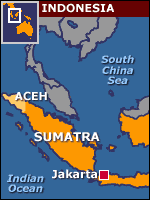Aceh Deal & The Aftermaths
 Noted economist Faisal Basri said that the peace deal signed yesterday by Indonesia government and Free Aceh Movement (GAM) has long-term snowball effects for the country as other natural resources-rich provinces could ask similar treatment.
Noted economist Faisal Basri said that the peace deal signed yesterday by Indonesia government and Free Aceh Movement (GAM) has long-term snowball effects for the country as other natural resources-rich provinces could ask similar treatment.“This is more than just a federal system. This is similar to Scotland. No wonder GAM signed that. But this deal will be employed by Papua to demand even higher than Aceh and we can’t just stop it,” Faisal quoted by Kompas today.
Under the peace deal, Aceh will have authority to raise loans from other countries, impose different interest rates than Indonesian Central Bank, charge local tax, full authority on marine resources, develop and manage all seaports and airports, and most of all to get 70% of hydrocarbon and other natural resources.
Many questions remain unanswered though. On foreign loans, it is not clear whether the deal give Aceh no veto from central government as under the existing law, local administrations are allowed to get foreign loans only with central government's approval.
On different interest rates, it is not clear whether Aceh will have their own central bank and currency accordingly. Details of local tax, profit sharing of hydrocarbon, and infrastructure management will also reshape the way local administration react to Aceh Peace Deal.
A successful peace agreement this time, surely could smooth the way for a $5 billion internationally-backed reconstruction programme in Aceh, where December's tsunami left some 170,000 people dead or missing and destroyed much of the infrastructure.It would also be a plus for investors looking for stability in the world's fourth most populous country.
Peace in Aceh might even reduce piracy in the Malacca Strait—one of the world’s most important shipping lanes, between Indonesia and the southern tip of Malaysia—as well as diminishing an militant insurgency in southern Thailand, since many of the Malacca pirates, and the Thai insurgents’ arms, are said to come from Aceh.
Peace deal will also smooth logging activities in Aceh and help local pulp and paper industry in time of tight wood supply. There are eight companies with license to cut trees in Aceh. PT Krueng Sakti is the largest with concession area of 115,000 hectare, followed by PT Raja Garuda Mas Lestari with 96,500 hectare. Raja Garuda Mas is one of the largest pulp and paper producer in Indonesia. (See Map)
But the deal could lead to other complicated problems and potential uprising in other natural resources-rich areas, especially West Papua which has strong separatist movement like Aceh. In June last year, 20 US senators wrote a letter to Kofi Annan, UN secretary general, urged him to appoint UN Special Representative to Indonesia to monitor and report on the situations in Aceh and Papua.
Talking about hydrocarbon, Aceh was natural gas-rich province, home to the first liquefied natural gas (LNG) plant in Indonesia. The plant, established in 1970s, has six trains with installed capacity of 12 million tones per year. ExxonMobil Oil Indonesia (EMOI) Inc supply gas to the plant from its gas fields in Lhoksukon and North Sumatra Offshore (NSO), both in Aceh territory.
But since 1995, output from those fields decreased significantly due to depleting reserves. As a result, the LNG plant, operated by PT Arun NGL (a joint venture between state-owned oil and gas company Pertamina, Exxon, and Japanese companies) is only running at 40% capacity. Last year, three out of six LNG trains in dormant. Next year, most likely only two trains will be in operation. In less than a decade, gas in the area will be depleted completely.
EMOI also supplies natural gas for two fertilizer plants in nearby. They are PT Asean Aceh Fertilizer (AAF) and PT Pupuk Iskandar Muda (PIM). AAF has one plant while PIM with two plants. Due to natural gas supply problem, AAF is about to be liquidated as the company already stopped its operation more than two years. PIM also has to shutdown one of its plants due to scarcity of gas. Thousands of workers are at stake in these companies, most of them are Acehnese.
PT Humpuss Aromatic, a company owned by Hutomo Mandala Soeharto (youngest son of former president Soeharto), is also processing natural gas from EMOI to produce fuels in Lhokseumawe area. Not to mention PT Kertas Kraft Aceh (KKA), the largest craft paper producer in Indonesia jointly owned by government and Nusamba (controlled by Mohammad Bob Hasan, close ally of Soeharto), that is rely on gas supply from EMOI.
Aceh’s oil and gas future is very much depend on the development of oil and gas reserves in Malacca Strait. A gas block called Block A is currently developed by ExxonMobil and ConocoPhilipps. But Exxon has announced it will sell its shares in the block saying the block is not economically viable anymore for the company. Government has asked Conoco to immediately make decision on the block.
In this oil and gas perspective, Aceh is actually the past for Indonesian economy. The real danger is if West Papua asking for similar or even better deal than Aceh. West Papua is known for its strong Free Papua Movement (OPM). Recently Papuan staged massive protest on weak implementation of special autonomy.
In West Papua, a consortium led by Beyond Petroleum, CNOOC (China), Mitsubishi Corporation (Japan) is constructing two LNG plants with combined capacity of 7 million tones per year and investment of US$3 billion.
Labels: Conoco, FREEPORT, Infrastructure, MITSUBISHI, Pertamina, SOEHARTO Inc
READ MORE!!!


0 Comments:
Post a Comment
<< Home